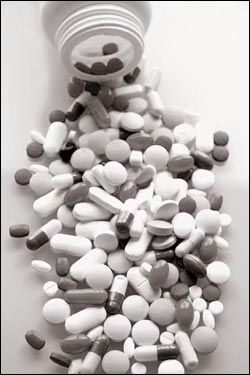Row over seizure of low-cost drugs
Martin Khor
A global controversy has arisen over
the seizure of low-cost generic medicine in European ports in transit
from India to other developing countries.
A new threat to the health of people in developing countries is being
caused by European Customs authorities seizing legitimate low-cost
generic medicine being shipped from India and China to other developing
countries.
This has deprived patients from having access to medicine that treat
many ailments including AIDS, heart ailments, Alzheimer's disease,
psychological problems and high blood pressure.
The medicine was being shipped mainly from India, where they were
produced by generic drug producers, to Latin American and African
countries. En route to their final destinations, the drugs were seized
in airports in the Netherlands and Germany, when the planes were in
transit, on the grounds that they could be "counterfeit" products.
|

Drugs come in different shapes, sizes and brand names |
Often, the Customs' actions were instigated by complaints from big
European companies alleging that the medicine may be counterfeit and
violate their intellectual property.
However, it turned out that the medicine was not counterfeit product
nor in violation of patent laws, but was legitimately produced by Indian
companies and being imported by Brazil, Peru, Colombia, Mexico, Nigeria
and other developing countries at prices much lower than the branded
drugs.
The seizure has caused outrage among the governments exporting and
importing the drugs and health groups. They are concerned that sick
people are being deprived of low-cost medicine, and that some European
governments are blocking legitimate trade between developing countries
in order to unfairly promote the commercial interests of their big drug
companies.
According to the Wall Street Journal of Aug 6, there have been more
than 20 cases since late last year when Customs officials in the
Netherlands and Germany held up the Indian medicine, saying they
violated European patent laws, eventhough the drugs were not intended
for sale there.
India is preparing to lodge a formal complaint at the World Trade
Organisation (WTO) aimed at stopping the European actions. The complaint
is expected to claim that the EU has allowed its giant drug companies to
misuse Customs regulations on counterfeit drugs in order to stop the
trade in legitimate generic medicine.
The European countries are said to be especially misusing the
European Commission's Regulation 1383/2003, which allows the seizure of
medical shipments if they are suspected of containing counterfeits or
infringing intellectual property laws.
Indian Commerce Minister Anand Sharma said his government had
protested to the European Union that its action was "absolutely wrong".
The Federation of Indian Chambers of Commerce and Industry said the
country's pharmaceutical companies had been "severely hit". The Indian
companies are incurring extra costs by making use of transit hubs
outside of Europe and to hire lawyers to defend them against the
European actions.
A group of 16 non-governmental organisations have also protested
against the Dutch and German actions.
The Wall Street Journal report details some of the seizure which are
at the centre of the uproar:
* In October 2008, Dutch Customs at Amsterdam airport seized a
shipment of a generic blood-thinning drug, clopidrogel, which was en
route to Colombia.
The drug was produced by the Indian firm Ind-Swift, and the seizure
was made on behalf of the European company Sanofi, which consented to
the release of the drugs only in May this year. Ind-Swift has re-routed
all its shipments through Malaysia and Singapore at double the cost.
* In November 2008, Dutch officials seized two shipments en route to
Peru (of the Alzheimer's disease medicine rivastigmine and the
antipsychotic medicine olanzapine) from Indian company Cipla.
The rivastigmine medicine, seized on behalf of Novartis company, was
detained for five months before being allowed to proceed to Peru. The
olanzapine medicine, seized on behalf of Lilly, is still held in the
Netherlands.
* In December 2008, Dutch Customs seized blood pressure drug Losartan
which was en route to Brazil, and held it for 36 days before returning
it to India.
* In February 2009, the AIDS medicine abacavir which was bound for
Nigeria was seized in Amsterdam and was released after a complaint by
the UN, which was the recipient.
* In May 2009, the generic drug amoxicililin (used in treating many
bacterial infections) was seized in Frankfurt airport en route from
India to Vanuatu in transit.
It was released after GSK, the company holding the patent, informed
the Customs that there was no trademark infringement.
At a WTO meeting on June 8, India and Brazil criticised the European
Union for the actions, which was confusing legitimate generic medicine
with counterfeit fakes, and which were undermining poor countries'
ability to obtain cheaper generic medicine.
Brazil said that trade in generic medicine is perfectly legal and
generics must not be mistaken for counterfeit or pirated products. The
European Customs' actions have hampered the access of the developing
world to affordable life-saving generic medicine.
India complained that seizures have continued to take place at
European ports, despite its protests at the WTO months ago. It has an
adverse systemic impact on legitimate trade of generic medicines,
South-South commerce, and universal access to medicine.
China, Cuba, Colombia, Ecuador, Egypt, Argentina, Venezuela and South
Africa also spoke against the European actions.
The European Commission responded that it is fully committed to
ensuring access to medicine, but it must continue to allow its Customs
authorities to act against counterfeit products. It claimed its Customs
regulation was in line with WTO rules.
- Third World Network Features
(The writer is the Executive Director of the South Center in
Swizerland). |



